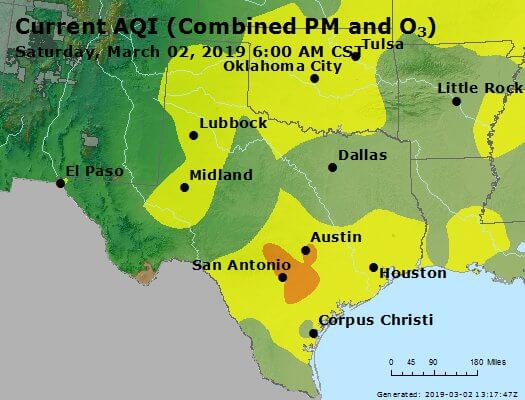This blog was updated at 8:47 a.m. March 2 to reflect that the Air Quality Index is no longer in the “Unhealthy Air Quality for Sensitive Groups” range in Round Rock.

A weather app message about “Unhealthy Air Quality for Sensitive Groups” could be found on iPhones of Round Rock residents and Central Texans this morning.
The Texas Commission on Environmental Quality (TCEQ) listed the Austin area’s Air Quality Index (AQI) at 115 around 7 a.m. Saturday, March 2, landing it in the 101-150 AQI range at which this alert occurs. After 8 a.m., the number had already dropped down into the “Moderate” range, which is between 51 and 100. An AQI above 150 is listed as “unhealthy” for the general public.
According to AirNow, “sensitive groups” include people with heart or lung disease, older adults, children and teenagers. These groups are advised to reduce prolonged or heavy exertion outdoors when an “Unhealthy Air Quality for Sensitive Groups” alert is in effect.
Other nearby cities showed similar messages in the iPhone weather app Saturday morning, including Austin, Hutto, Cedar Park, Pflugerville and Georgetown. The National Weather Service had a Dense Fog Advisory in effect for South Central Texas through 11 a.m.
“Ozone season” actually started March 1 in Central Texas, according to Air Central Texas, which is a regional initiative to reduce exposure to air pollution through voluntary actions.
High ground-level ozone concentrations in Central Texas, not to be confused with the stratosphere ozone layer, are the result of a complex interaction of emissions and meteorology. Ground-level ozone can sometimes be referred to as smog, and breathing in high concentrations of it over several hours can cause acute respiratory health effects including decreased lung function and pain with deep breaths and aggravated asthma symptoms.
Summer days in Texas are especially susceptible to ozone formation due to clear, sunny skies and stagnant winds, which allow pollutants to form and accumulate. During these times, residents are encouraged to limit driving and idling in vehicles, and ensure their vehicle and yard equipment are properly maintained, including changing the oil and replacing air filters regularly.
Learn more about air quality at roundrocktexas.gov/airquality.


